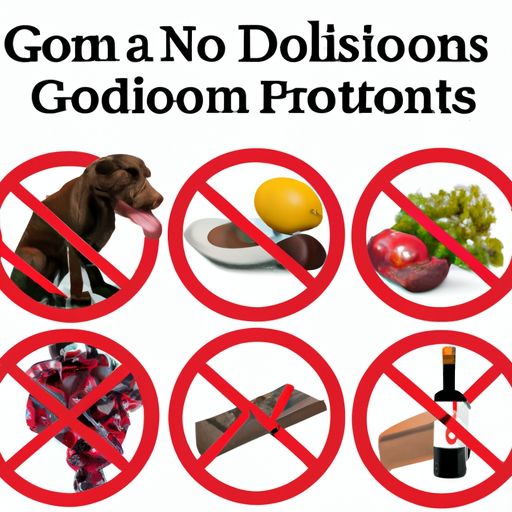Being a caregiver for a furry friend, you’re likely aware that not all human food is fit for your canine companion. This piece dives deep into the subject, shedding light on various foods that are harmful to dogs.
1. Chocolate and Caffeinated Products
As much as you might love indulging in chocolate, it’s crucial that you keep it away from your beloved pet. Chocolate contains theobromine and caffeine, both of which are toxic to dogs. Dark chocolate and unsweetened baking chocolate are particularly dangerous.
- Theobromine can cause vomiting, diarrhea, abnormal heart rhythm, tremors, seizures, and even death.
- Caffeine can lead to restlessness, increased heart rate, tremors, and in severe cases, lung failure.
2. Onions and Garlic
Onions and garlic might be staple ingredients in your kitchen, but they can wreak havoc on your dog’s health. Both are part of the Allium family and can cause anemia in dogs, leading to weakness, breathlessness, and lethargy.
3. Grapes and Raisins
Despite their small size, grapes and raisins can cause serious harm to your dog. They can lead to sudden kidney failure, a condition that can be life-threatening.
4. Alcohol
Alcohol and foods containing alcohol can cause vomiting, diarrhea, decreased coordination, central nervous system depression, difficulty breathing, tremors, abnormal blood acidity, and even death.
5. Xylitol
Xylitol is a sugar substitute often found in sugar-free products. It can lead to insulin release in most species, which can lead to liver failure.
6. Dairy Products
Dogs do not process lactose as efficiently as humans, so consuming dairy products can lead to digestive problems, including diarrhea and other digestive upset.
7. Raw Meat and Eggs
Raw meat and raw eggs can contain bacteria such as Salmonella and E. coli, which can be harmful to pets and humans. Raw eggs also contain an enzyme that decreases the absorption of biotin, which can lead to skin and coat problems.
8. Salty Foods
Feeding your dog salty foods can lead to excessive thirst and urination, and even sodium ion poisoning. Symptoms of too much salt include vomiting, diarrhea, depression, tremors, elevated body temperature, seizures, and even death.
| Toxicity Level | Symptoms | |
|---|---|---|
| Coffee | High | Restlessness, seizures |
| Onion | Medium | Weakness, breathlessness |
| Grapes | High | Kidney Failure |
| Alcohol | High | Vomiting, difficulty breathing |
| Xylitol | High | Liver failure |
| Dairy | Low | Digestive upset |
| Raw Meat | Medium | Food poisoning |
| Salt | High | Thirst, seizures |
Frequently Asked Questions
Can dogs eat chocolate?
No, chocolate is toxic to dogs and can cause severe health issues, including vomiting, diarrhea, and even death.
Are onions and garlic harmful to dogs?
Yes, onions and garlic, both from the Allium family, can cause anemia in dogs, leading to weakness and breathlessness.
Can dogs eat grapes and raisins?
No, grapes and raisins can cause sudden kidney failure in dogs—a condition that can be life-threatening.
Is alcohol safe for dogs?
Absolutely not. Alcohol can cause a range of health problems in dogs, from vomiting and diarrhea to seizures and even death.
What about dairy products?
Dogs do not process lactose efficiently, so consuming dairy products can lead to digestive problems, including diarrhea.
Is raw meat safe for dogs?
Raw meat can contain harmful bacteria like Salmonella and E. coli. While some pet owners believe in a raw food diet, it’s best to consult with a vet first.
Can dogs eat salty foods?
Feeding your dog salty foods can lead to excessive thirst and urination, and even sodium ion poisoning. Symptoms of too much salt include vomiting, diarrhea, and seizures.



